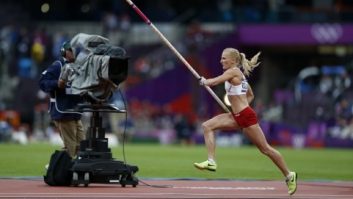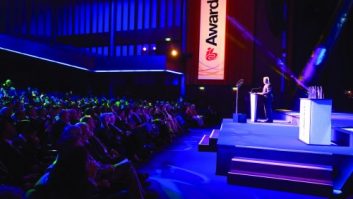By Philip Stevens
When the BBC televised the London Olympics in 1948, those involved could hardly have imagined what broadcasting the next games from that city would entail. That said, it must have been quite an achievement to provide around 60 hours of coverage from a service that had only relatively recently been reactivated after the war.
According to the BBC archive, one of the significant developments for the 1948 events was the introduction of an OB truck that allowed the crew to sit down for the first time!
This time around, about 2,500 hours will be transmitted on two of the BBC’s broadcast channels, supplemented with up to 24 live streams on broadband and other events being shown via the ‘red button’ facility.
“These have become known as the digital games,” Roger Mosey, BBC’s director of London 2012, told TVBEurope. “That means we are operating in entirely new territory – and that brings its own set of exciting challenges.”
Mosey recalls there was a great sense of excitement and anticipation when the announcement was made in July 2005 that London would be the venue for this year’s Olympic Games. “I was working in TV news at the time and there was a sense of elation as the full impact of the decision was realised. I believe it was a fantastic moment for the country.”
Although some low level planning had already taken place within the BBC as part of the London bid, the real effort didn’t begin until the Beijing games of 2008 were over. “Those Olympics were the biggest outside broadcast we had ever mounted and there was enough to occupy our attentions. But once that was completed we devoted ourselves to 2012.”
He says that the Beijing games had many gargantuan features, but the BBC is aiming for something quite different – surrounding the actual sport with cultural and other events. While the Olympics is a majority event with 75% of the population planning to watch the sporting activities, there is a need to involve the rest of the viewing audience with something of the excitement of the spotlight being on London.
“We are going to be looking at the surrounding stories, news, the torch relay and the culture. We will be providing something for everyone – you will not have to love sport to enjoy the occasion.”
For instance, the BBC will provide coverage of activities under the title of the Cultural Olympiad. These include offering Shakespeare productions, a music festival in east London and Promenade concerts from the Royal Albert Hall.
“The opening ceremony for the games will be special, but for those who are not too interested in that event, there will be the opportunity of seeing Daniel Barenboim conducting Beethoven’s Ninth. That will make the night special for those viewers.”
Overseeing both sides of the BBC’s London 2012 obligation is Dave Gordon, head of Major Events. “I’ve been involved with 10 Olympic Games, but this is surely the most exciting. We have much experience at coverage of important events, but that doesn’t mean we just dust off the plans for the previous games and reuse the formula. However, we do have the core knowledge, and so 2012 doesn’t daunt us.”
Like Mosey, Gordon sees the biggest innovation for London 2012 as the opportunity to exploit the red button and internet offerings.
“We used the red button at Beijing, but we are now at a new stage, where we can show everything. If a viewer wants to watch, say, six indoor volleyball matches one after another, that will be possible. We appreciate the diversity in the UK and our service will cater for that factor.”
He states that programme editors will no longer face the difficult decision to cut away from one sport to another at a crucial moment – the coverage will be available somewhere on the various platforms.
Although it is not the host broadcaster (that’s Olympic Broadcasting Service – OBS, based in Madrid), Gordon knows that if anything goes wrong, the UK audience will blame the BBC. So planning has to be meticulous.
“We will be taking the coverage offered by OBS and then packaging it to suit our viewers’ needs by adding our own commentary, presentation, context and features. We’ll be taking a look at the bigger picture and providing the stories that will resonate with British audiences.”
He adds that the BBC, unlike some other international broadcasters, will not be myopic in its approach. “We will not ignore athletes from other countries. We will be where the stories are – no matter who is involved.”
Broadcast resources
Such an approach involves a great deal of resources. As far as the coverage on behalf of the host broadcaster is concerned, the BBC is using the OB resources offered by SIS (Satellite Information Services).
To cater for its UK transmissions, a presentation area is being built by the BBC within the Olympic Park venue. In addition, space within the International Broadcasting Centre (IBC) has been allocated for production galleries and edit suites.
“We have designed these production areas with the Games in mind. The workflow has been created to make the best use of the space. And we will be virtually tapeless – although there may be an odd tape to provide back up, if necessary. We have also designed a special communication system to enable to us to speak to any and all venues as needed.”
Beyond the facilities surrounding the Olympic Park in east London, the BBC is using its new media centre at Salford Quays, near Manchester. “This will be fully utilised with a great deal of the streaming and web based transmissions being handled by the state of the art equipment we have at that site.”
One other major innovation will be in use at some event venues – Super Hi-definition. “We have a unique partnership with NHK in Japan,” asserts Gordon. “And that will enable some coverage in this format – although, of course, this will not involve domestic live transmissions.”
Gordon confirms there will be a limited amount of 3D recording – but the priority remains providing coverage in the format used by the majority audience.
Beyond technology
There is, of course, a huge amount of planning to handle an event like the Olympic Games. And they will be over in a relatively short period of time. But the experience will leave a legacy for the future. Both Both BBC director of London 2012 Roger Mosey and colleague Dave Gordon agree that the experience of London 2012 will mean a better understanding of the streaming technology. “These digital Olympics will enable us to meet the twenty first century need for consumer choice. The various platforms provide that opportunity and London 2012 will be a milestone in that development,” states Gordon.
But beyond technology, Mosey also sees the personal development of work skills as a legacy. “The Olympics will require a high level of manpower and to help handle that we have run two rounds of our apprenticeship schemes and several work experience periods. We now have a very sound base of technical operators and this training will provide an ongoing benefit for the industry as a whole.”
He concludes, “All in all, this really is going to be a very positive and exciting year for the BBC.”







